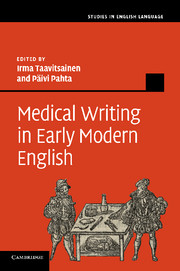Book contents
- Frontmatter
- Contents
- List of plates
- List of figures
- List of tables
- Notes on contributors
- Preface
- List of abbreviations
- 1 An interdisciplinary approach to medical writing in Early Modern English
- 2 Medical texts in 1500–1700 and the corpus of Early Modern English Medical Texts
- 3 Medical literacies and medical culture in early modern England
- 4 Verbs of knowing: discursive practices in early modern vernacular medicine
- 5 Defining in Early Modern English medical texts
- 6 Dissemination and appropriation of medical knowledge: humoral theory in Early Modern English medical writing and lay texts
- 7 Code-switching in Early Modern English medical writing
- 8 New arguments for new audiences: a corpus-based analysis of interpersonal strategies in Early Modern English medical recipes
- 9 Efficacy phrases in Early Modern English medical recipes
- 10 Medical pamphlets: controversy and advertising
- 11 The development of specialized discourse in the Philosophical Transactions
- 12 The expression of stance in early (1665–1712) publications of the Philosophical Transactions and other contemporary medical prose: innovations in a pioneering discourse
- Appendix A Raw data tables corresponding to Figures 4.3–4.14
- Appendix B Raw data tables corresponding to Figures 8.1–8.4
- Appendix C Stance markers used in the analysis in Chapter 12
- Appendix D Preliminary list of texts in the corpus of Early Modern English Medical Texts (EMEMT)
- Bibliography
- Index
3 - Medical literacies and medical culture in early modern England
Published online by Cambridge University Press: 03 May 2011
- Frontmatter
- Contents
- List of plates
- List of figures
- List of tables
- Notes on contributors
- Preface
- List of abbreviations
- 1 An interdisciplinary approach to medical writing in Early Modern English
- 2 Medical texts in 1500–1700 and the corpus of Early Modern English Medical Texts
- 3 Medical literacies and medical culture in early modern England
- 4 Verbs of knowing: discursive practices in early modern vernacular medicine
- 5 Defining in Early Modern English medical texts
- 6 Dissemination and appropriation of medical knowledge: humoral theory in Early Modern English medical writing and lay texts
- 7 Code-switching in Early Modern English medical writing
- 8 New arguments for new audiences: a corpus-based analysis of interpersonal strategies in Early Modern English medical recipes
- 9 Efficacy phrases in Early Modern English medical recipes
- 10 Medical pamphlets: controversy and advertising
- 11 The development of specialized discourse in the Philosophical Transactions
- 12 The expression of stance in early (1665–1712) publications of the Philosophical Transactions and other contemporary medical prose: innovations in a pioneering discourse
- Appendix A Raw data tables corresponding to Figures 4.3–4.14
- Appendix B Raw data tables corresponding to Figures 8.1–8.4
- Appendix C Stance markers used in the analysis in Chapter 12
- Appendix D Preliminary list of texts in the corpus of Early Modern English Medical Texts (EMEMT)
- Bibliography
- Index
Summary
Measuring medical literacy
Who read the medical texts gathered in the corpus of Early Modern English Medical Texts (EMEMT) between 1500 and 1700, and, equally interesting and important, who did not? These are questions not only about competence and the ability to read but also about ability to gain access to books and other vehicles of print publication, and about the interests and purposes of the potential consumers of print. Questions of competence, the first kind of question, bring us to the problem of literacy. The degree to which the population of early modern England was literate has been keenly debated by historians, and there has been a lot of frustration expressed in that debate with the imperfections involved in trying to measure literacy statistically. Reading itself leaves few marks or none at all for historians to record and interpret, and it has proved impossible to find a useful statistical measure of ability to read in the period 1500–1700. We are left with measures of the ability to sign one's name, which has an uncertain and unquantifiable correlation with the ability to read. However, writing is at least susceptible of statistical measure since the signing of documents for various purposes was required of large numbers of people. Using signatures to documents as a measure, it has been calculated from the subscriptions to the Protestation Oath of 1642 that 70 per cent of adult English men and 90 per cent of English women were illiterate, that is, unable to sign their names as opposed to making marks on documents (Cressy 1980: 176–7).
- Type
- Chapter
- Information
- Medical Writing in Early Modern English , pp. 30 - 43Publisher: Cambridge University PressPrint publication year: 2011
- 6
- Cited by



